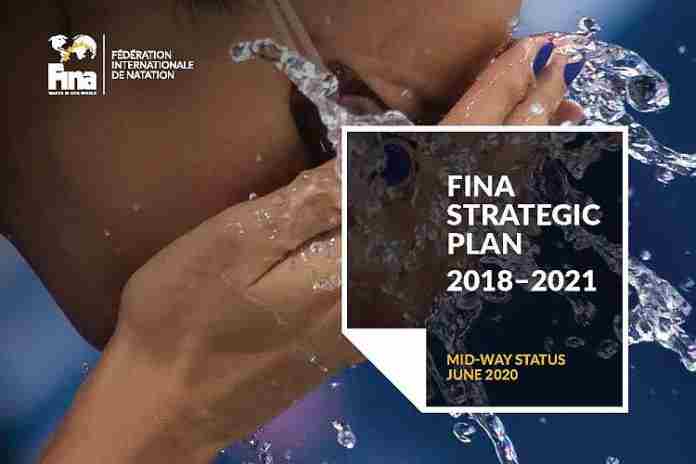(Friends: As you know, TheSportsExaminer.com is a free site, but we still have expenses, for hosting and technical support. Our semi-annual bill has arrived, and if you value what you read here, perhaps you can donate to help with the costs. Thank you.)
The Federation Internationale de Natation (FINA) – the international federation for aquatic sports – is at the same time both celebrated and reviled.
Founded in 1908, it is outwardly one of the most successful federations in the world, with $107 million in reserves at the end of 2018, a vibrant World Aquatics Championships every two years and annual “World Cup” programs of varying success in each of its six disciplines: swimming, open-water swimming, diving, high diving, artistic (formerly synchronized) swimming and water polo.
On the other hand, the recently-released governance study by the Association of Summer Olympic International Federations (ASOIF) had FINA as one of the worst IFs, ranking in the lowest tier. Along with the federations for judo, weightlifting, and new-for-Tokyo 2020 federations for baseball-softball, surfing and skating, FINA scored between 84 and 119 points, out of a possible 200. (The top federations scored from 170-187: badminton, cycling, equestrian, football, rugby and tennis.)
So which is it?
There are significant clues in a new FINA report, entitled “FINA Strategic Plan 2018–2021. Mid-way Status – June 2020.” Covering 89 pages, this is a progress report on the original set of goals – the FINA Strategic Report 2018-21 – adopted three years ago.
The report notes the original goals, what has been done to date and what is still being pursued. There is some good work being done:
● §1.3: Raising Standards: programs for better management of national federations, including educational and financial support, plus “Scholarships Programme, Schools for Officials, Clinics for Coaches and Officials, Coaches Certification Programme, Development Centers, Olympic Solidarity Programmes.
“203 National Federations have been provided with support, and have been involved in any of these activities, redistributing almost 20 Million USD.”
● §3.2: Anti-Doping: “FINA signed a contract with the International Testing Agency (ITA). Starting from the 1st January 2019, out-of-competition testing programme is independently managed by ITA, including testing management and athlete biological passport.”
Also: “Active involvement, including presentations and panel discussions, of Athletes during FINA World Aquatics Conventions and other major gatherings.” (Important, since athletes often ignore these during major competitions.)
● §3.3: Education and Compliance: “Pathway developed with progressive learning opportunities for all Officials, Referees and Judges for all the Aquatics Sports ensuring that those officiating at FINA or Olympic competitions have been duly certified by FINA.”
● §5.1: Participation: “Strong increase (14%) in number of [national federations] participating at the FINA World Championships and competing among all six Aquatics disciplines (results of 2019 compared to 2017).”
● §6.1: Business strategies: “FINA Athletes Committee members started to attend various FINA competitions, with the aim to maintain direct dialog with the Athletes.” (This was not being done?)
But at the same time, there were inexplicable entries such as:
● §2.1: Governance: “To establish policy for publication of Minutes of FINA Executive and FINA Bureau meetings.
“To develop and release a FINA Good Governance document.”
No wonder the federation received such a low governance grade in the ASOIF study!
● §5.2: “Goal: 100% of Athletes Competing in FINA Events Have Coaches Certified by FINA.”
● §10.3: Ongoing Investment: “To facilitate development of solutions for installations for the organisers of the FINA major events to achieve best return on investments.”
In addition, it’s worth noting that FINA has, for some time, paid the travel and accommodations expenses of participants in its World Championships, something that very few federations do. This was not mentioned anywhere.
FINA also has worthwhile goals for the future, such as working with national and international groups to prevent drowning through its “Swimming for Life” initiative, and to extend the total member registrations of its worldwide national federations from 34 million to 50 million in the next four years.
But there is no information on “how” these goals will be achieved. Further, there is significant attention paid to FINA’s commercial future and how it can expand swimming’s impact worldwide, but no indication on how it will happen:
● “FINA Marketing Department to produce advice and guidelines to Athletes on ‘now’ and ‘next’ in terms of staying in touch with fans and sponsors and ideally increasing relevance for these.”
● “Capturing the attention of audiences worldwide, FINA events will create unique and valuable entertainment properties that attract and grow audiences for every discipline.
“Develop a consistent calendar of exciting events to include all disciplines.”
But once you read and re-read the report, the core concept for growth comes through, and although easy to pass over the first time, it is stated with clarity in §6.3:
“LEVERAGE OLYMPIC GAMES TO PLACE AQUATICS CENTRE STAGE”
And reinforced by the headline of §9.2:
“REMAIN A VALUABLE AND COMMITTED PARTNER TO THE INTERNATIONAL OLYMPIC COMMITTEE”
The report notes that “FINA has been confirmed as the IF at the Olympic Games bringing the biggest number of Athletes, representing the most countries and territories,” which is completely untrue, at least as to athletes. Aquatic sports in Rio 2016 had a combined 1,437 entrants per the authoritative Olympedia site, vs. 2,270 for Athletics. For Tokyo in 2021, the quota for Athletics was shaved to 1,900, with FINA’s sports at a combined 1,410. The aquatic sports have 49 Olympic events combined to 48 for Athletics.
FINA’s strategy for its relationship to the Games is clear and stated thus:
“To continue promoting High Diving to be included in the Olympic programme.
“To continue the efforts for securing an increase in number of participating Athletes (in Diving, Water Polo, Marathon Swimming).
“To further develop and present arguments for the inclusion of additional Swimming events (e.g. mixed relay and 50m events in the programme of future Olympic Games), Mixed duet events in Artistic Swimming, etc.”
This is going to be really difficult since the International Olympic Committee has already committed to reducing the total athlete count for the Games to 10,500 from 2024 onward. But FINA will be asking for more and more.
And the Olympic Games is the keystone of FINA’s plan to expand interest in its own events, per the to-do item in §8.2 on building audiences:
“To develop communication strategies to more effectively transfer the massive interest for Aquatic Sports at Olympic Games into similar interest at FINA’s events (e.g. FINA Swimming World Cup, FINA Diving World Series, etc.).”
This is really interesting for several reasons:
(1) FINA has stated bluntly what has become obvious, but that no wants to say: the Olympic Games are important and nothing else is. Back in March, legendary Australian coach Bill Sweetenham said in an interview, “The Olympics is the only competition that matters, the rest are pretenders! They should prioritise the Olympics first and foremost as, historically, no-one, but no-one, recognises or remembers any other result or competition.”
Now FINA is saying it, but more politely.
(2) There was no mention in the entire Mid-Way Status report of either the Olympic Channel or the subscription-based FINAtv program, both of which were hoped-for promotional panaceas.
(3) While there was notice taken of the increase in FINA’s social-media audiences in recent years – now about 809,000 combined, exclusive of Chinese apps for which data was not publicly listed – no information was listed about FINA’s Web site traffic or engagement.
FINA is to be congratulated for sharing publicly its Mid-Way Status report, something many other federations would not do. The federation has achieved much, but by its own reckoning, is still stuck in the valley of Olympic sports which have not broken free of the Games as its primary vehicle for public recognition.
To its credit, FINA gets it and included in its to-do list the ultra-difficult task of “To further develop [a] plan for FINA Partners to make investments in the FINA programmes as a
supplement or alternative to involvement in FINA competitions.”
With no end in sight to the coronavirus pandemic, that might be job one.
Rich Perelman
Editor
You can receive our exclusive TSX Report by e-mail by clicking here. You can also refer a friend by clicking here.

























